Community rescues trumpeter swan with tennis ball stuck on its bill
Administrator | Feb 09, 2021 | Comments 2
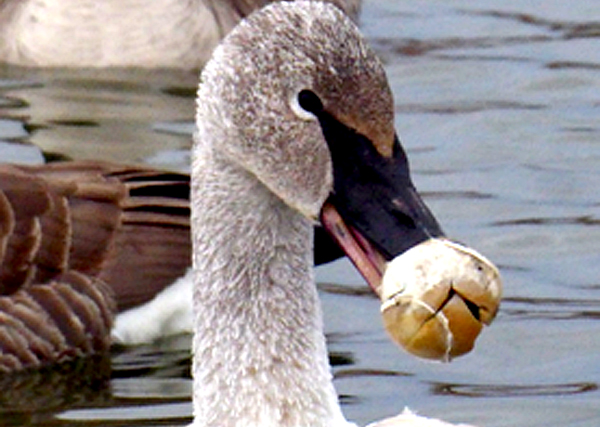 A trumpeter swan cygnet with an old tennis ball stuck on the end of its bill has a caring, dedicated community to thank for his recent rescue from a probable slow death by starvation, on the frigid water at Wellington harbour.
A trumpeter swan cygnet with an old tennis ball stuck on the end of its bill has a caring, dedicated community to thank for his recent rescue from a probable slow death by starvation, on the frigid water at Wellington harbour.
Plans and capture attempts to free “Wilson” of the object that was preventing him from eating properly were foiled, and remade, over the period of a month or so as local residents fell into a quiet routine to build trust, and coax him to come within reach.
Jim Agombar, one of several Wellington on the Lake residents involved, tells the story, and shares photographs he and Ian Barker of Bloomfield, had taken along the way:
By Jim Agombar
Anyone who has ventured down to the Wellington harbour docks, to take in the beautiful scenery, is usually taken aback by the large numbers of waterfowl that make the harbour their temporary home.
This is especially true in winter, when frozen inland waterways and lakes drive the waterfowl down to the last open sources of shallow water feeding areas along the shores of Lake Ontario.
Two examples of such areas are, Wellington Harbour and Barcovan, where moving currents tend to keep the water from freezing over and provide these waterfowl with the accessible bottom vegetation that they require to get them through the winter. On any given day, one is likely to see more than a thousand birds comprised of swans, Canada geese, mallard ducks and various others, feeding in the shallows.
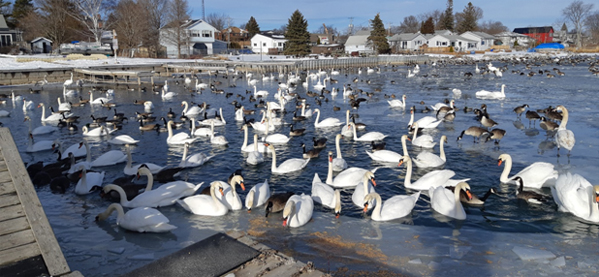
A favourite among many, are the beautiful white majestic Swans that seem to immediately draw your eye, as they gently glide among the waterfowl in search of a meal.
In the last month there has been something truly unusual in the harbour. A trumpeter swan cygnet with an old tennis ball stuck on the end of its bill.
Don’t ask me how it got there. It was first spotted on Jan. 10th by Marcia Spelde who reported it to Kim Stevenson of the Ontario Trumpeter Swan Group Facebook page.
This triggered a series of calls resulting in them contacting Ange OZ McLean MacIsaac, their contact to the Foster Forest Wildlife Orphanage, operated by Dee Newbery near Trenton.
A request was then relayed to me to confirm the sighting of this distressed cygnet. Sure enough, there he was, with a ball attached to the end of his bill making it impossible for him to close his mouth. This would have to be a race against time to save him, since the ball prevented him from feeding in the usual way.
Many ideas were suggested, as several volunteers and concerned individuals such as Dale Smith, a local Wellington on the Lake birder and PEPtBO volunteer also got involved. Terry Sprague, our local naturalist, as well as the Toronto Wildlife Centre and Sandy Pines Wildlife also gave advice and suggestions.
Several capture attempts were made using chest waders and nets, all to no avail. “Wilson” as he came to be known, was too wary and maybe too smart for his own good. He just wouldn’t come close enough for capture.
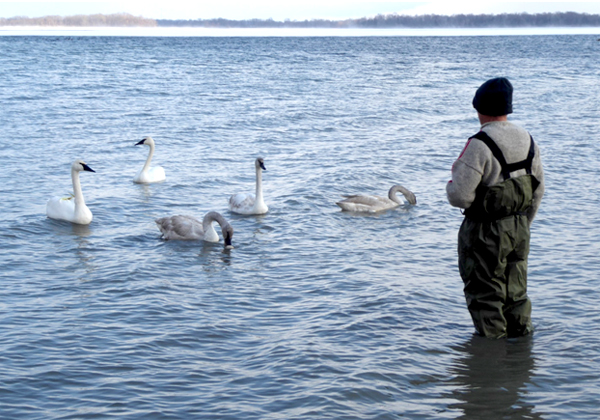
Throwing a net now seemed to be the best option for capture, but the frigid water and slippery shoreline made recovery efforts nearly impossible. The use of boats was abandoned as the family would simply fly away whenever it felt threatened. More and more, it seemed that nothing more could be done to help Wilson.
The only option left, was to hopefully develop a bond of trust between the swan family and Dale. Since he was familiar with “Nanuuq” (pronounced Nanook), the large yellow tagged (K46) male of the family, Dale volunteered to try to build on that trust through regularly scheduled daily feedings in the morning and afternoon.
Dale and I are both involved in a winter supplemental corn feeding program meant to support the swans during the short times when the open water shallows freeze over. This was how Dale and “Nanuuq” first met. With us being around regularly, the plan was for Dale to try to feed the Trumpeters while I distracted the rest of the waterfowl by feeding them in another area.
After some experimentation with healthy supplemental foods such as lettuce, peas, corn and duck feed, it became obvious that Wilson could not manipulate such small particles of food, due to the ball being in his way.
It looked more and more like Wilson would suffer a heartbreakingly slow death by starvation, had it not been for his ability to adapt and find a way to manage large pieces of whole wheat bread. While bread is normally frowned upon as a junk food for waterfowl, due to its lack of nutritional value, in this case, something was better than nothing. More importantly, it bought us time to keep trying for a rescue.
Now Wilson had a chance for survival and we fell into a quiet routine of daily feedings while always being at the ready if the opportunity to remove the ball came along. Each day usually started with a “Where’s Wilson” conversation or text as we continued with our plan. The cold weather and water conditions made the prospect of a capture, much more easily said than done. Attracting Wilson, also meant attracting the rest of his trumpeter swan family, compounding the difficulty of our efforts.
Nanuuq and his family are part of the Ontario Trumpeter Swan Reintroduction Program originally started at the Wye Marsh area (north of Toronto) back in the early 90s. The tags on Nanuuq are used as identifiers meant to help scientists and naturalists track his location and migration patterns.
Weeks passed, and word of Wilson’s plight got around on social media, bringing many well-intentioned people out to investigate for themselves. This posed a serious problem to our efforts until finally a request to the municipality got road barriers installed at the beach-park and marina docks. These were placed to deter spectators and cars from approaching and helped to restore a more peaceful atmosphere from which we could work.
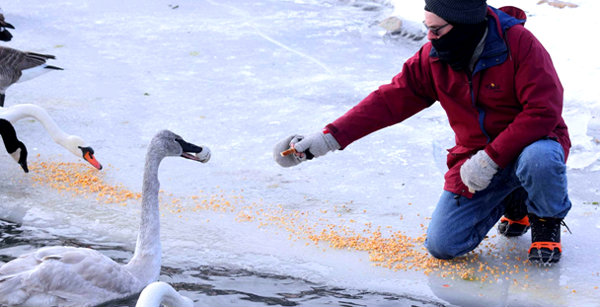
Eventually, the trumpeters were coaxed closer and closer to Dale every day, but Wilson remained frustratingly, just out of reach.
Often setbacks would occur, likely caused by well-intentioned individuals, who were also trying to help, but had missed with their efforts of reaching out for Wilson. This only made him more wary of us as he stayed at the rear of the family for several days. But again, almost a month from Wilson’s initial sighting, and in spite of some of this year’s worst winter weather, our patience and determination finally paid off.
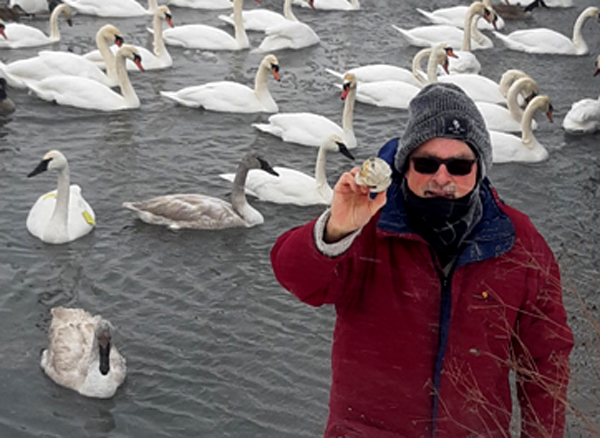 While I drew the large flocks off with a good corn feeding at the end of the dock, Dale was able to feed the hungry trumpeter swan family by hand, and removed the ball from Wilson’s bill. I was fortunate to witness the shock of surprise on Dale’s face when he came up with that ball. Wilson also looked a bit surprised, not realizing right away what had just happened.
While I drew the large flocks off with a good corn feeding at the end of the dock, Dale was able to feed the hungry trumpeter swan family by hand, and removed the ball from Wilson’s bill. I was fortunate to witness the shock of surprise on Dale’s face when he came up with that ball. Wilson also looked a bit surprised, not realizing right away what had just happened.
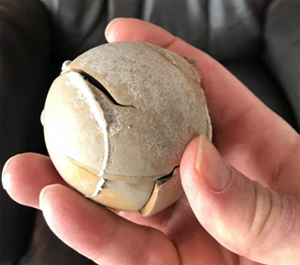 Over the next few days, Wilson was observed to be back to eating his usual corn and seemingly suffering no major ill effects from his ordeal. Dale and I, on the other hand, now seem to have a lot of time on our hands. “Tennis anyone?”
Over the next few days, Wilson was observed to be back to eating his usual corn and seemingly suffering no major ill effects from his ordeal. Dale and I, on the other hand, now seem to have a lot of time on our hands. “Tennis anyone?”
The success of this operation, would not have been possible if not for our dedicated team of countless volunteers, and concerned citizens who offered their support and time to save Wilson. Special recognition to Dee Newbery, Ange OZ McLean MacIsaac and Andrea Kingsley for their assistance and advice on rescue techniques. In short, our amazing team of swan rescuers were really “on the ball!”
The Foster Forest Wildlife Orphanage is a local non-profit organization which relies on its volunteers and donations for the successful rehabilitation and release of local orphaned wildlife. Consider a donation to them by contacting the centre at (613) 394-6667 or visit the Facebook page at
https://www.facebook.com/FosterForestWildlifeOrphanage
If you would like to help sponsor our swan winter supplemental feeding program in the form of a donation for corn, contact the County Farm Centre in Picton via the “Forest Wildlife Account”. You can contact the County Farm Centre at (613) 476-2171 and ask for the front cashier counter.
You are also encouraged to report sightings of trumpeter swans (especially those in lesser frequented areas) to the sites listed below, to help them track their location and migration patterns.
https://www.wyemarsh.com/swan-sightings
Ontario Trumpeter Swan Facebook page
https://www.facebook.com/groups/259764354096464
Filed Under: cheers • Featured Articles
About the Author:

































Congratulations. A wonderful good news story.
Thank you for your selflessness.